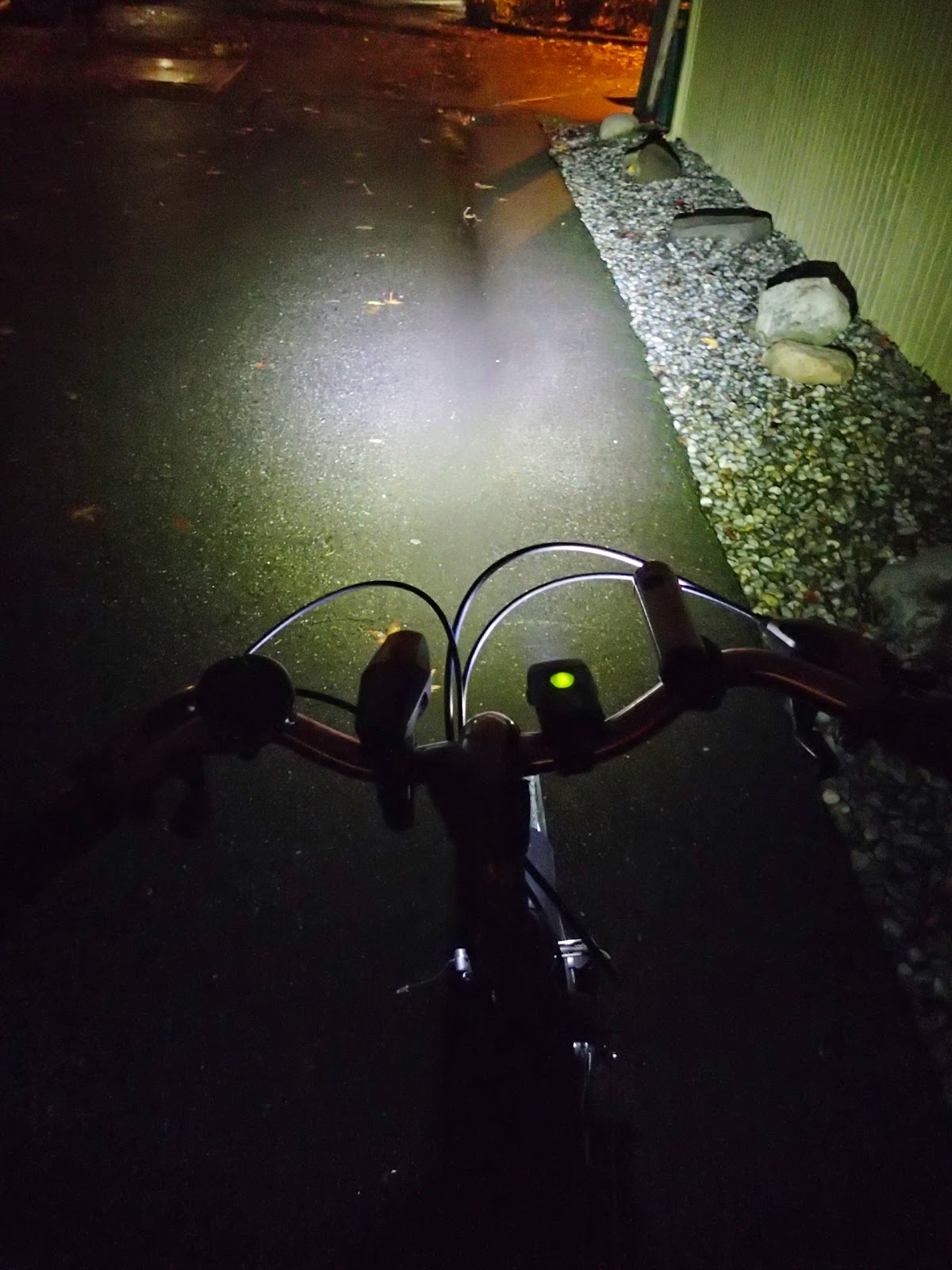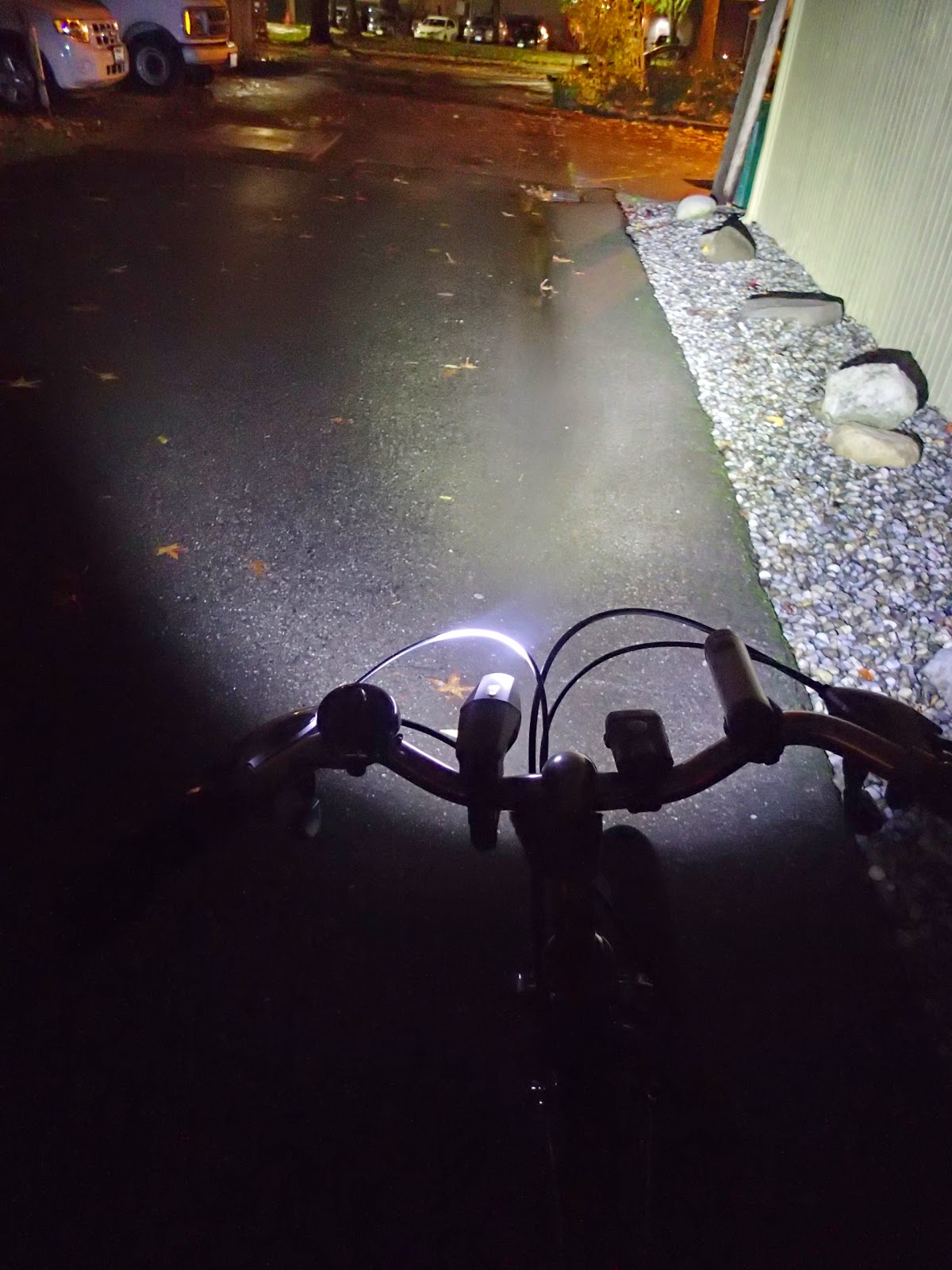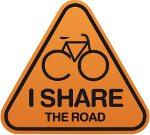The three lights I examined are the Cygolite Dash 320, the Portland Design Works (PDW) Lars Rover 450, and the Bontrager Ion 700. Here are the three lights with their high beams on laying on my kitchen table:
 |
| Cygolite Dash 320 (top), Bontrager Ion 700 (middle), PDW Lars Rover 450 (bottom) |
 |
| The Cygolite Dash 320 |
 |
| The PDW Lars Rover 450 |
 |
| The Bontrager Ion 700 |
It's hard to do an "apples to apples" comparison as the lights have different powers, designs, prices and features, but the table below is a compact summation of the various lights specifications.
| Cygolite Dash 320 | PDW Lars Rover 450 | Bontrager Ion 700 | |
|---|---|---|---|
| Weight | 74 grams | 122 grams | 141 grams |
| Charge Time | 4 hours | 5.5 hours | 5 hours |
| Charge Connector | USB Micro B | USB Mini B | USB Micro B |
| Side Visible? | Yes | No | Yes |
| Attachment | Stretchy Band | Stretchy Band, Adjustable Screw Clamp, Helmet Mount all included. |
Stretchy Band. Bontrager Blendr and Screw Clamps available. |
| High Beam | 320 Lumens 1.25 hours |
450 Lumens 2 hours |
700 Lumens 1.75 hours |
| Medium Beam | ? Lumens 2.5 hours |
250 Lumens 3.75 hours |
450 Lumens 3 hours |
| Low Beam | ? Lumens 9 hours |
125 Lumens 7.5 hours |
250 Lumens 5.75 hours |
| Pulse Beam | 2.75 hours | 10 hours | 22 hours |
| Flashing | 10 hours (primary) 55 hours (secondary) |
10 hours | 45 hours |
| Price | $54.95 | $85.00 | $99.99 |
People have differing degrees of night vision and senses of how much light is enough. While a lumen rating can be a guide, beam patterns vary. I found 250 lumens and a broad beam pattern OK for night riding in the city at non-breakneck speeds, but for racing down a dark mountain trail requires a more lumens packed into a beam with a tighter focus.
I'd like to say a word about flashing vs. steady lights. In some locales flashing lights are illegal and some folks find them very distracting. Other people find the blinking is eye-catching and more clearly IDs the light source as a bike instead of a distant car and favor the blinking for those reasons. And blinking lights do extend the battery life.
I personally have been more in the steady light camp but all three of these lights have a great light mode that is sort of a middle way and it's become my favorite for city riding. Pulse mode is different than a simple On/Off flash. The beam is never off but instead it's punctuated with a cycling brighter pulse. This effectively extends both the battery life and the reach of the beam and seems to be less distracting while still drawing attention.
I mounted the three lights on my bike and went out in the alley behind my house on a dark, damp night to do a bit of beam comparisons of the three lights. It's hard to get good pictures at night, but these shots will give you a bit of an idea of the relative beams of the three lights.
 |
| Cygolite Dash 320 (high beam) |
 |
| PDW Lars Rover (high beam) |
 | ||
| Bontrager Ion 700 (high beam) |
The Cygolite Dash 320 has a unique design, featuring 4 small LEDs across the top and a high-power LED below. Riders interested in a "be seen" light for daylight use might find it's Daylighting mode handy. This mode combines lights the 4 top LEDs constantly while flashing the high-power at a claimed 500 lumens for a 10 hour runtime. This mode should not be used at night, it's too obnoxious and freaky. There is also a mode that just flashes the top LEDs which gives 55 hours of runtime.
The Cygolite Dash 320 mounts via an integral rubber band and only really works on a handlebar. It's a well designed unit, well-balanced and the stretchy strap mount works well. The main beam is nicely directed with side channels to allow a bit of side visibility. The USB Micro B charging port is located in the back of the light and covered with a rubber flap. So far I haven't had any problems with water leaking into the light, but the other two lights have their charging ports underneath the light which is probably a better location in terms of things staying dry.
I've found the Cygolite Dash 320 provides plenty of light for my city rides and its compact size makes it a perfect light for my kick scooter.
The PDW Lars Rover 450 has a very nice, well directed beam and comes with most mounting options of any of the three lights I tested. The light is a bit front heavy and I found it would be prone to rotate downward when used with the stretchy mounting strap, but the included screw clamp is rock solid and the light also comes with a helmet mount.
The PDW Lars Rover 450 charges via is USB Mini B port instead of what is now the more common USB Micro B. A charge cable is included with the light but users should be aware that the charge cable that works with their phone or tablet is probably has a different connector than the Rover does. The build quality of the Rover is excellent and the charge port on the bottom of the light should stay nice and dry under its rubber cover.
The PDW Lars Rover 450 doesn't have any side lighting, all the photons are blasted out the front. I've found it to be a nice light for night trail riding, casting all the light I need. But for folks who want even more power, PDW makes a more powerful version, the PDW Lars Rover 650.
The Bontrager Ion 700 is a very elegant light. It's got the sleek look and feel of an Apple product. I found myself never using the highest power settings on this light, instead using its power to get both perfectly adequate light and great runtime. But it's great having the 700 lumens in reserve in case the night turns dark and stormy.
While the Bontrager Ion 700 is the heaviest of the lights I tested, it's nicely balanced and I found the included stretchy clamp worked great on my handlebars. The Ion can also fit into any of the Bontrager Blendr stem mounts or various Bontrager helmet or clamp mounts.
The Bontrager Ion 700 has a good beam pattern with little amber side lights. The charging port on the bottom of the light uses the common USB Micro B connector and is nicely protected under a rubber cover.
My only real complaint with the Bontrager Ion 700 is aesthetic. I've never been fond of white bike accessories. While I'm sure the Ion looks great on the latest Trek Madone, I think something like the PDW Lars Rover 450 looks better on a mountain bike or my scruffy-looking Allant. But I've never been known for my fashion sense.
I know there are lots of other lights out there but these three lights are good examples of the current crop of USB rechargeable lights. For a hundred bucks or less you can get a good light to keep you rolling through the dark of night.








5 comments:
Hey, Kent... do you know the "form factor" of the rechargeable batteries in these lights? Common AA/AAA or some kind of proprietary battery pack? I like my rechargeables in a normal shape that can be replaced with commonly-available batteries in a pinch. Always nice to be able to pop into a convenience store and get fresh batteries if I happen to stay out too long between charges.
I like the pulse mode on tail lights and didn't realize they're available for headlights now.
Hey Kent,
Nice article. MTBR.com does a big bike light review every year and provides a lot of useful information.
thanks for talking about this in your blog. I want to add a personal favorite for this particular group, which is the busch and muller ixon core. it it a really smart little light that fits well into this category. http://www.bumm.de/produkte/akku-scheinwerfer/ixon-core.html
Post a Comment